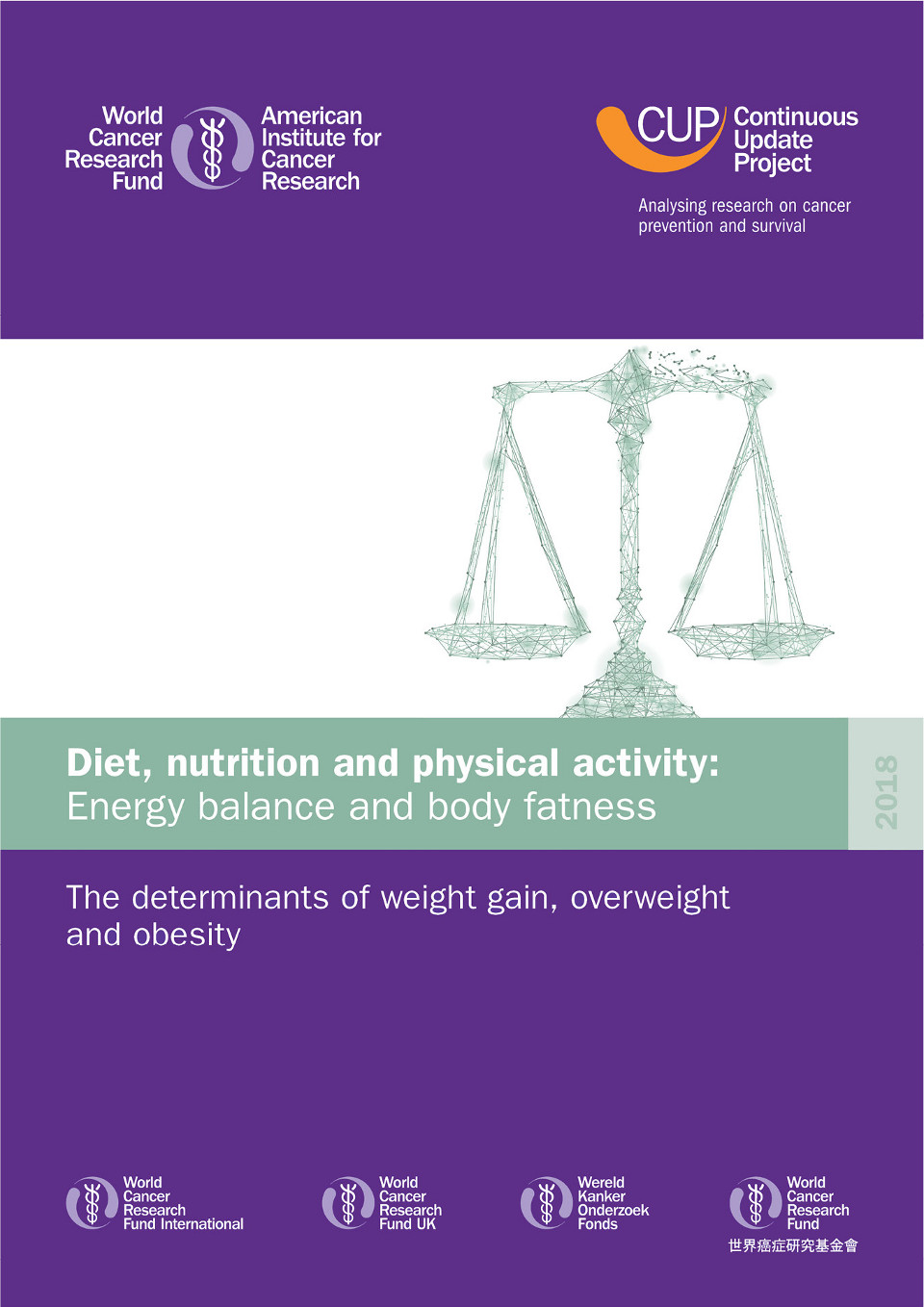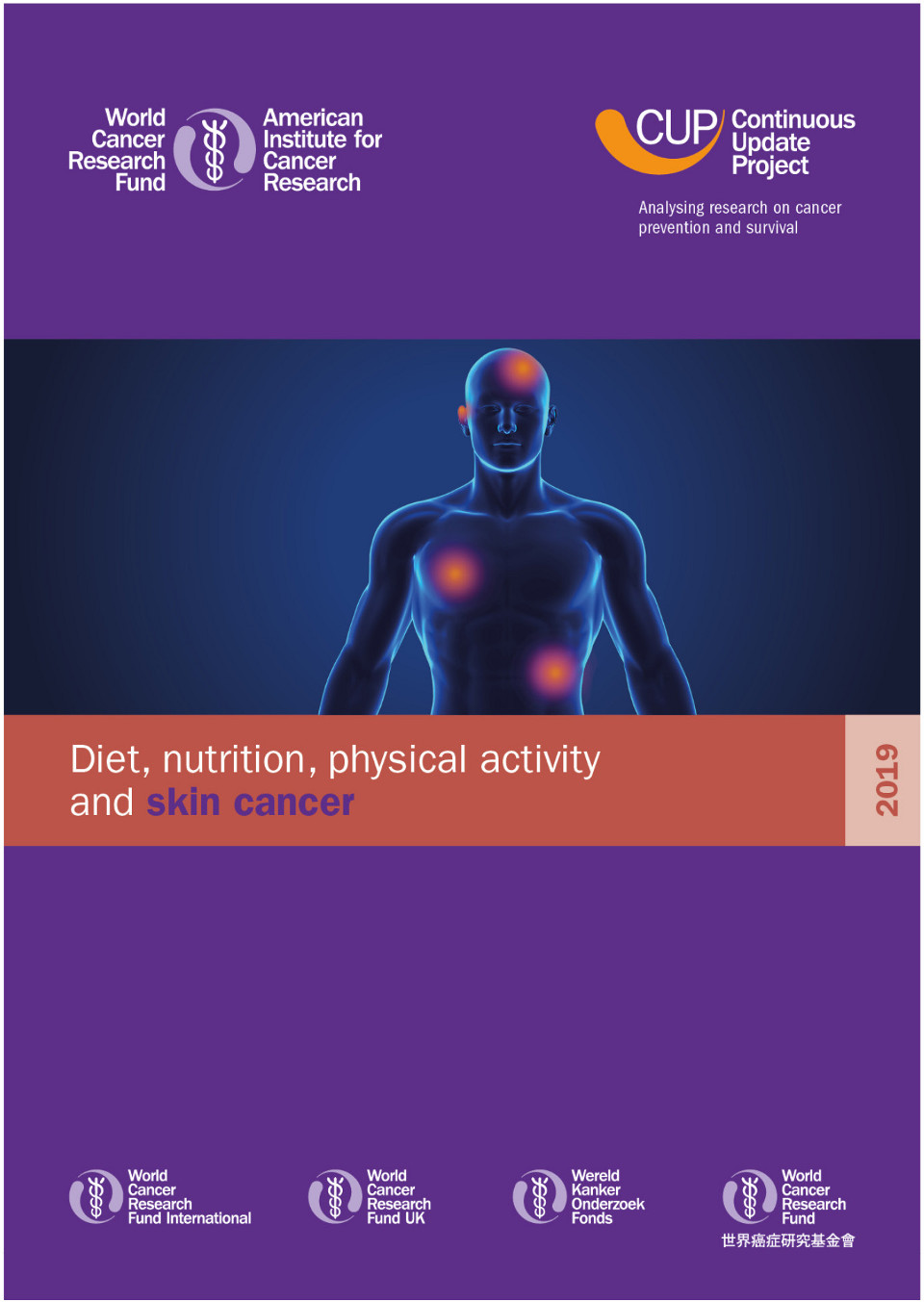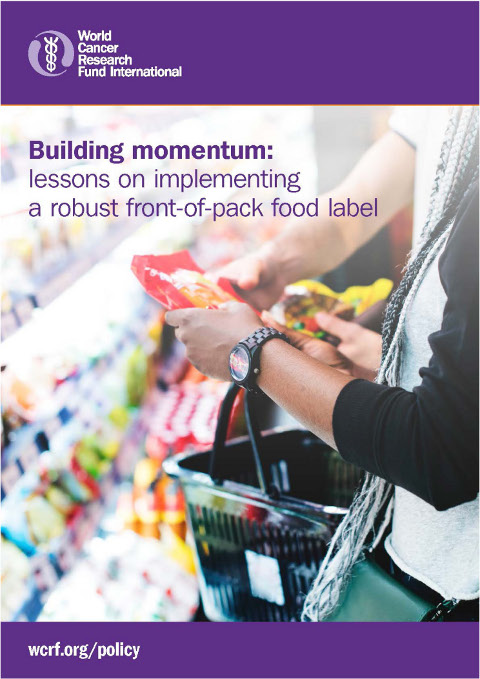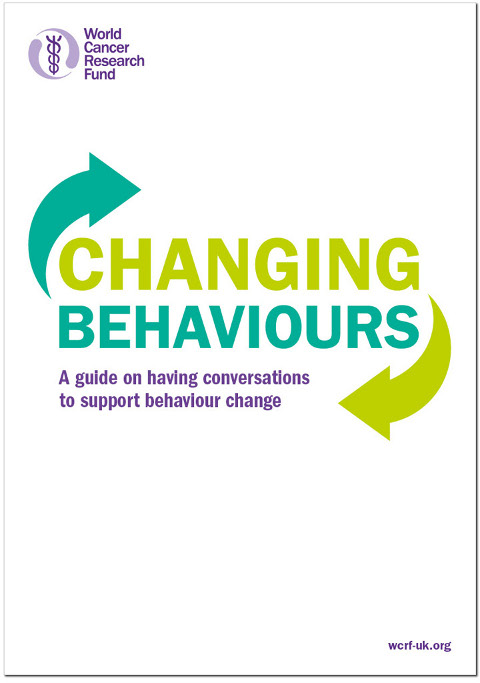A message from Marilyn Gentry
This year has been an incredibly proud one for me as we take a huge step forward in our mission. This is a year where we look to the future of cancer prevention and survival.
When I was growing up, nobody talked much about cancer, let alone how it could be prevented. Today, thanks to the groundbreaking scientific research funded by World Cancer Research Fund, we now know there are many things we can do to help prevent cancer. Indeed, it is now scientifically accepted as fact that people can reduce their risk of cancer through a healthy diet, being a healthy weight and being physically active.
That’s why we are looking towards new priorities in cancer prevention and survival – what can we be doing to further advance our knowledge in cancer? You will see some of the key areas we are starting to investigate through our cornerstone global cancer prevention database also known as the Continuous Update Project (CUP).
I am also pleased to say that we have stepped up our work around cancer survival, and you can read more about some of the exciting projects we ran this year and are planning to continue to develop over the coming years.
One in two people will develop cancer but around 40% of cases are preventable. That is around 144,000 people in the UK every year. That is why we continue to empower the public and work with health professionals so that they can help people make lasting changes to their lifestyles to help reduce their cancer risk.
I want to take this opportunity to thank everyone – donors, fundraisers, staff, trustees, scientists, grant recipients and many others – who contributed to the work of WCRF this year, and indeed to those who have made our achievements over the last three decades possible. Next year will see us marking and celebrating our 30th anniversary and it is with renewed zest that we look to the future of cancer prevention and survival. I hope you can continue to support us on this journey, as there is much still to do if we are to live in a world where no one develops a preventable cancer.

Marilyn Gentry, Founder and President
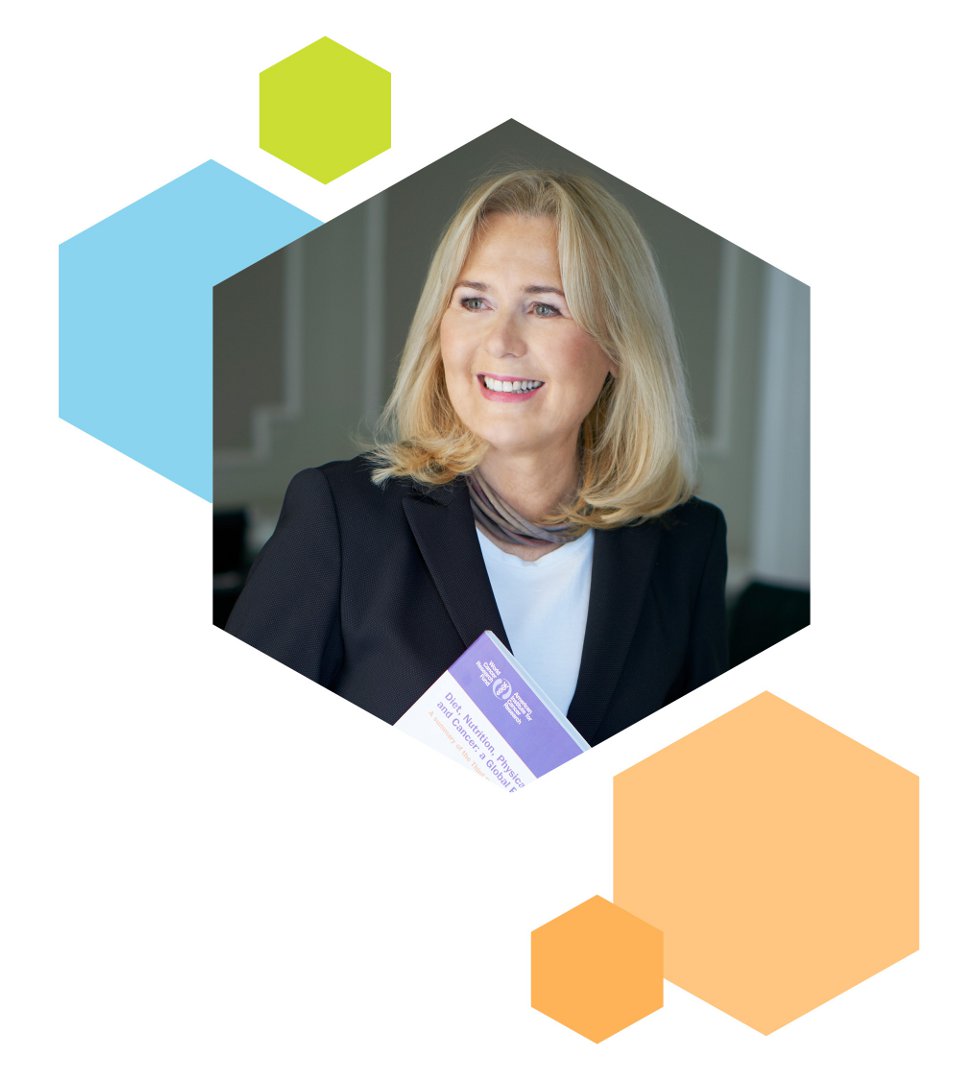
Our vision, mission and goals
We want to live in a world where no one develops a preventable cancer
Our mission is to champion the latest and most authoritative scientific research from around the world on cancer prevention and survival through diet, weight and physical activity – so that we can help people make informed lifestyle choices and reduce their cancer risk.
What we do
In the UK, cancer affects one in two people. We investigate the causes of cancer and help people to understand what they can do to help prevent it through:
- FUNDING scientific research into the links between cancer and lifestyle, particularly diet, weight and physical activity.
- ANALYSING all the research in this area from around the world to ensure our message is current and based on the most accurate evidence.
- GIVING people practical, easy-to-understand advice about how to reduce their risk of cancer.
- WORKING with governments and decision-makers to influence policy.
Through scientific research, healthy living advice and policy influence, our work benefits everyone who wants to reduce their cancer risk.
Our evidence-based Cancer Prevention Recommendations
One of the hardest things for people worried about cancer is the deluge of conflicting advice. We cut through the jargon and turn the latest evidence-based research into practical, straightforward advice and information to help anyone who wants to reduce their risk of developing cancer.
Our panel of world-renowned independent experts from across the globe have reviewed decades of evidence and developed the most reliable cancer prevention advice currently available. This is summarised in our Cancer Prevention Recommendations designed to help people make healthy choices in their daily lives to reduce their risk of cancer:
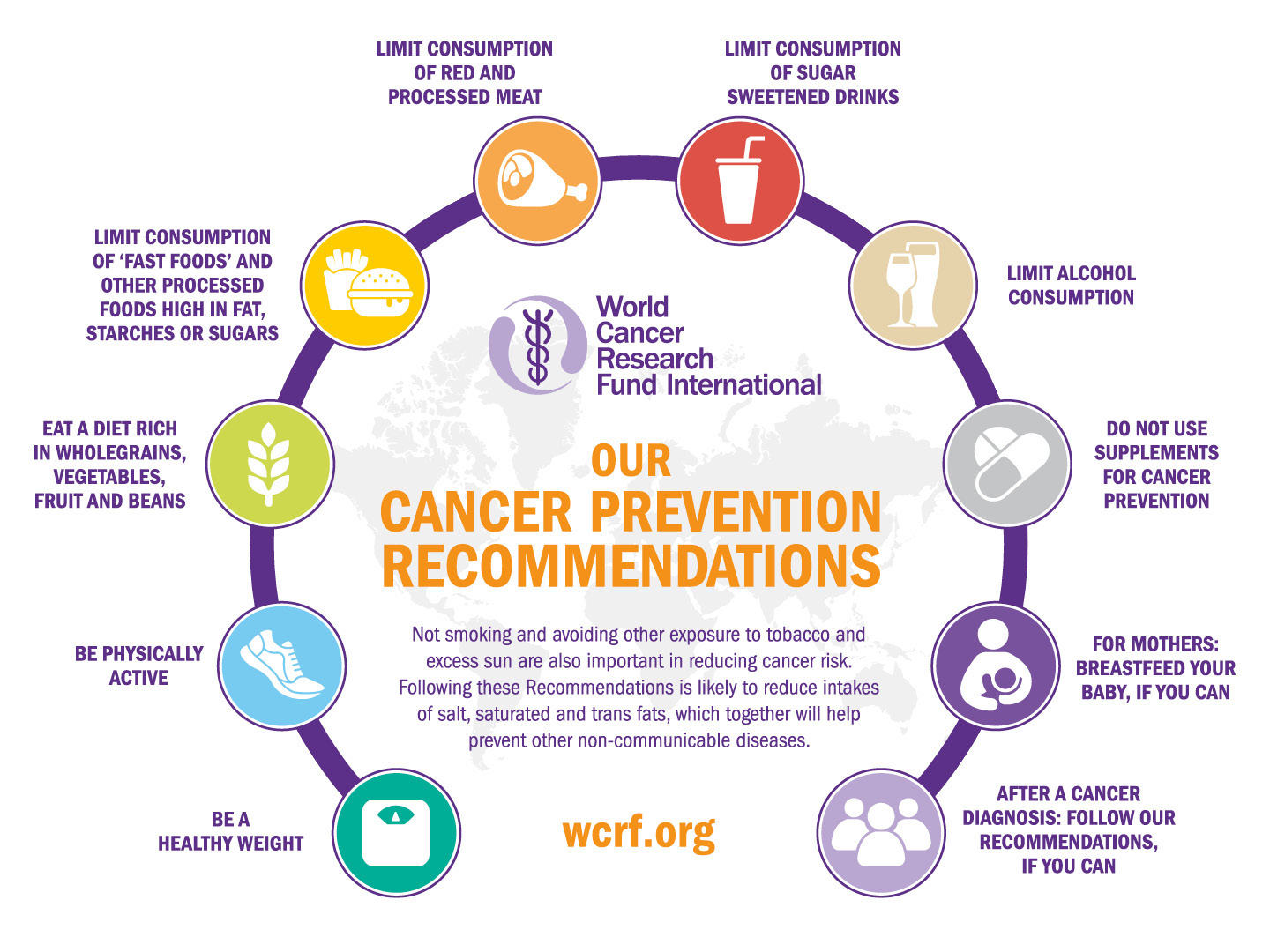
Analysing research by scientists around the world into the links between diet, physical activity, weight and cancer.
The CUP – our global cancer prevention database
Forming the cornerstone of all our work, our global cancer prevention database, the largest of its kind in the world is housed at Imperial College, London. Trusted by oncology experts, researchers and health professionals worldwide, and regularly evaluated by an independent panel of leading cancer experts.
This ongoing project, known as the Continuous Update Project (CUP), currently contains nearly 10,000 papers on cancer prevention and survival. Over 140 scientists from more than 17 different countries contribute to it, and researchers have been able to examine the database in real time as it is constantly updated.
Why is the CUP so important?
CUP findings inform our Expert Reports, which give a comprehensive analysis of the worldwide body of evidence on the prevention of certain cancers.
Reports on individual cancers
Analysis from the CUP helps us to produce regular reports on individual cancers.
Cancer Prevention Recommendations
We have 10 Recommendations to help everyone reduce their cancer risk and these are based on the latest scientific evidence available from the CUP.
Future research priorities
Detailed analysis of the CUP database identifies gaps in our knowledge and important new research priorities, which can be used to drive forward the research agenda in the area.
Reports published in 2018/19
We published two CUP reports; Diet, nutrition and physical activity: Energy balance and body fatness and Diet, nutrition, physical activity and skin cancer, launched in November 2018 and June 2019 respectively.
Next steps for the CUP
In May 2018 we published our Third Expert Report, a decade-long review of all the global evidence on diet, nutrition, physical activity, and cancer prevention and survival.
Following this, a Transition Panel, made up of prominent scientists in the field from across the globe, convened in February 2019 to identify and begin reviewing eight priority areas for research that will inform the future development and direction of our cancer prevention database.
These are:
- Systems approach – Creating a framework to better understand the cancer process at multiple levels.
- Dietary and lifestyle patterns – Better understanding of how patterns of eating and behaviour affect cancer risk.
- Biological processes – Digging deeper into key biological mechanisms.
- Cancer subtypes – Understanding how different factors affect different cancer subtypes.
- Life course – Understanding how factors across the whole lifespan link to cancer.
- Childhood cancer survivors – Outlining how the WCRF Network can investigate this area.
- Outcomes after a cancer diagnosis – Furthering our understanding of nutrition and lifestyle during and after cancer.
- Evidence search & synthesis process – Reviewing the robust process by which we conduct our work.
The results from each of these areas will inform the future development of the CUP, including the ongoing direction of our global cancer prevention database.
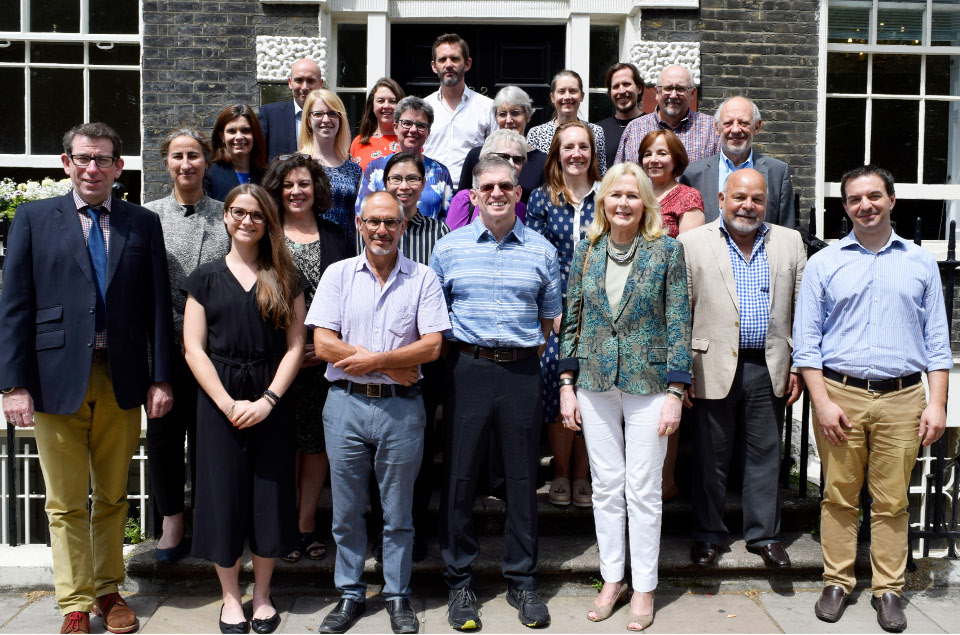
Other cancer charities focus on treatment. We’re different. We focus on prevention and survival.
Since inception, we’ve invested over £117 million in research projects that contribute to filling gaps in our scientific knowledge about cancer. Our research looks at the links between diet, weight, physical activity and cancer. Every year we invest in research across different areas of science, including review projects, such as the CUP, traditional laboratory-based projects and clinical trials.
Highlights from the research we funded
Research into how lifestyle choices affect our cancer risk
Our research has shown what lifestyle choices affect cancer risk but what is still unknown is how – to know this, we need to know what processes are happening in our bodies to make us more at risk. That’s why we’ve teamed up with the University of Bristol to pioneer a new way of identifying vital gaps in our knowledge around how our bodies respond to outside exposures and help us better understand how cancer develops.
Innovative research
We are proud to have funded four new innovative research projects during 2018/19 that will contribute to filling gaps in our scientific knowledge about cancer and help determine whether:
- Metabolites (small molecules found in our cells) that are associated with obesity cause colorectal cancer.
- A vegetarian diet reduces the risk of cancer.
- Cancer interacts with other diseases such as diabetes in overweight patients.
- Exercise can help fight cancer in leukaemia patients.
Encouraging the next generation of new scientists
The WCRF International Academy Programme was set up in 2009 to help develop future leaders in the field of nutritional epidemiology and cancer prevention. We now have 41 alumni Fellows based in 22 countries around the world. They range from PhD students, to associate professors, to scientific and policy advisers.
Our Academy activities range from workshops on a particular area of diet, physical activity and cancer, through to more in-depth courses and conferences. Our Fellowships are awarded to outstanding applicants; to apply, applicants can email academy@wcrf.org for more information.
Inarie Jacobs, one of our 2019 Academy Fellows and a registered dietitian working in Bambisana Hospital, South Africa, said:
“Being a WCRF Academy Fellow has enabled me to start building a network of scientists and researchers I hope to collaborate with in the future. Being young in a scientific and academic environment can sometimes feel overwhelming and intimidating, but meeting other students as well as experts was very inspiring. It made me realise that getting results in this field is a marathon and not a short sprint.”
In February 2019, as part of our Academy activities, Wageningen University in the Netherlands held a masterclass on nutrition and cancer in collaboration with WCRF and Wereld Kanker Onderzoek Fonds (WKOF). The masterclass connected people from across the world who are working on nutrition and cancer to share the latest insights in the field.
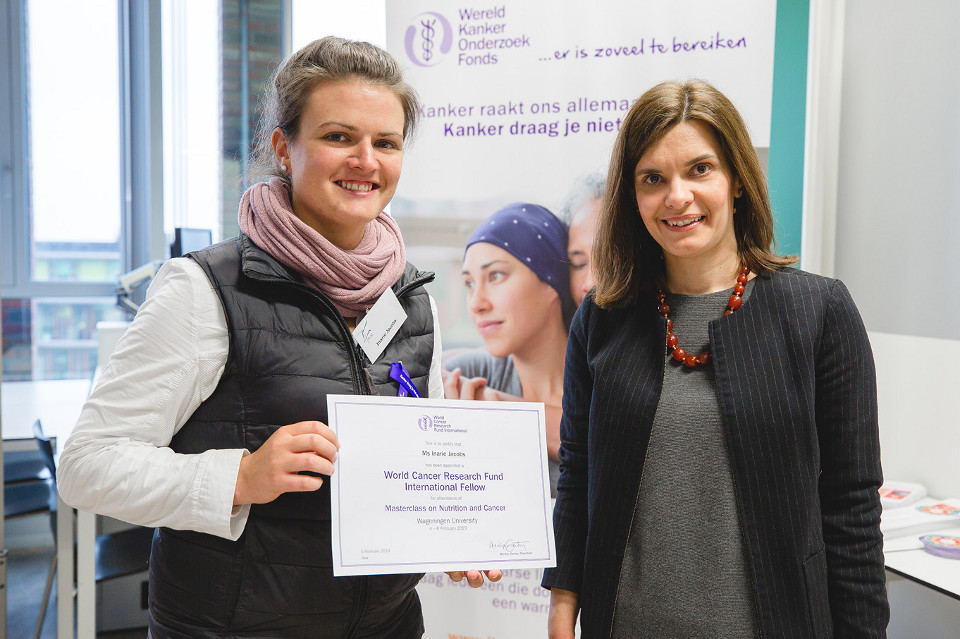
New tools to support policymaking around the world
We continue to update our online policy tool, NOURISHING, that shows policymakers and organisations which food policies have been used by governments across the globe to help encourage people to eat healthier.
We are also involved in CO-CREATE, a five-year €10 million EU-funded project focusing on preventing childhood obesity in Europe by involving young people in the process. As part of this project we will be looking at what physical activity policies governments should consider implementing to encourage people to move more to tackle obesity.
Collaborating with partners
We continue to work with the World Health Organization (WHO) as part of our Official Relations status, which was renewed in January 2019, as well as with other inter-governmental agencies and national governments to input into global initiatives and policy development opportunities.
Building Momentum series
In January 2019, we launched the second report in our evidence series, Building momentum: lessons on implementing a robust front-of-pack food label. This provides advice to policymakers about putting in place front-of-pack food labels amidst the different challenges they might face.
Our clear, evidence-based information helps people make more informed choices about their health
Reaching more people
Engaging people with our cancer prevention messages
We put in place a new social media strategy in 2018/19 to ensure all our messaging is integrated across all communication channels; among other things this allowed us to be more responsive to news stories to help increase awareness and engagement. This new strategy saw a continued growth in our social media presence. As an example of this a WCRF post on Twitter about red and processed meat gained 14,592 impressions, was retweeted 43 times and liked 59 times.
Although social media is an ever more important way to engage with the public, traditional press is still a key channel for reaching people with health messages. During 2018/19 we were mentioned 6,622 times in the press, potentially reaching over 600 million people and an advertising value equivalent of almost £17 million. This is double the press activity for the previous year.
Improving our digital presence
Our digital presence is extremely important as it allows us to reach far more people – and for far more people to find and access our content – than we ever could without it, but it is a constantly evolving platform and channel. This year we rolled out many updates, including migrating our fundraising pages from their own microsite to integrate them into our own website. As a result, the performance of this section is improving steadily, with the number of people entering this section from Google up by over 100%.
Our online health tools, including our Cancer Health Check and BMI calculator, were completed 254,819 times.
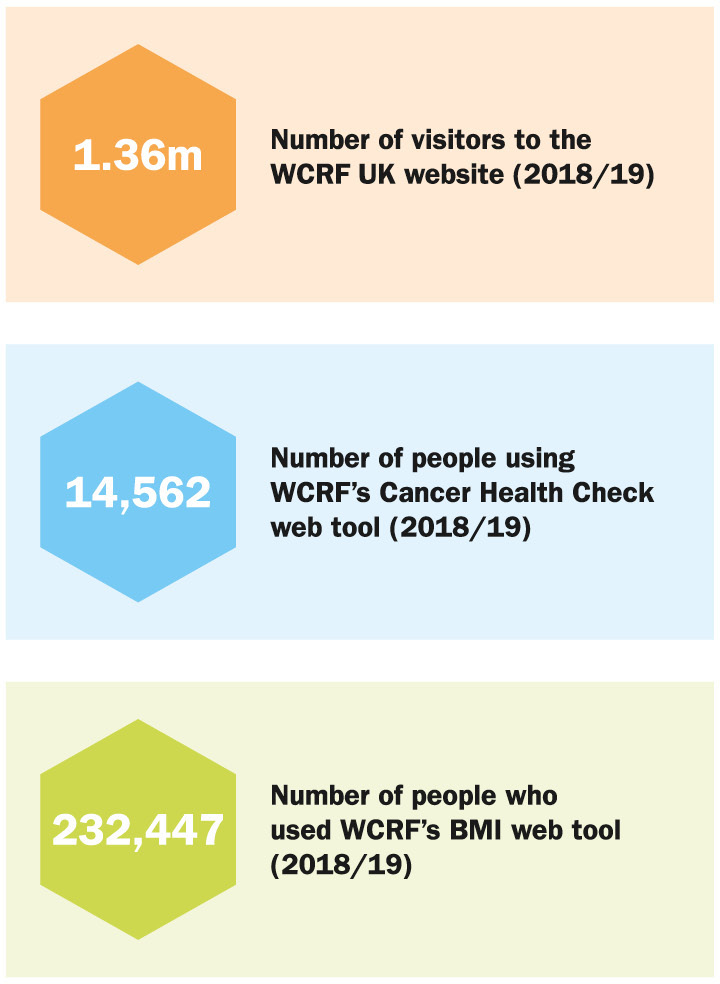
Helping people during their cancer treatment
Science and flavour: the perfect recipe
During the year we teamed up with co-founder and chef, Ryan Riley, from Life Kitchen to develop an exciting new recipe booklet for people living with cancer. Life Kitchen provides free cookery classes for people living with cancer to help them to restore their pleasure of food by focusing on taste. This is an important issue as cancer treatments such as chemotherapy, radiotherapy and certain medications can affect the way food and drink taste, as can cancer itself.
Working closely together we developed 15 new recipes that meet Life Kitchen’s ethos of taste and flavour while also following WCRF’s nutritional guidelines.
On 12 August 2019, we launched the recipe booklet at a London restaurant, where canapes based on the recipes were served. The event was hugely successful with patients, health professionals, food bloggers and influencers attending the event such as Deborah James, presenter of BBC Radio 5 live’s
You, Me and the Big C, and Lucy Alexander, presenter of BBC One’s Homes Under the Hammer.
Many attendees, as well as those unable to attend, shared the event and recipes on social media including Jamie Oliver and Nigella Lawson. The booklet and an interview with Ryan were featured in the Daily Telegraph.
We are excited to say that we have a number of different projects that we are developing with Ryan and Life Kitchen after the success of our first booklet.
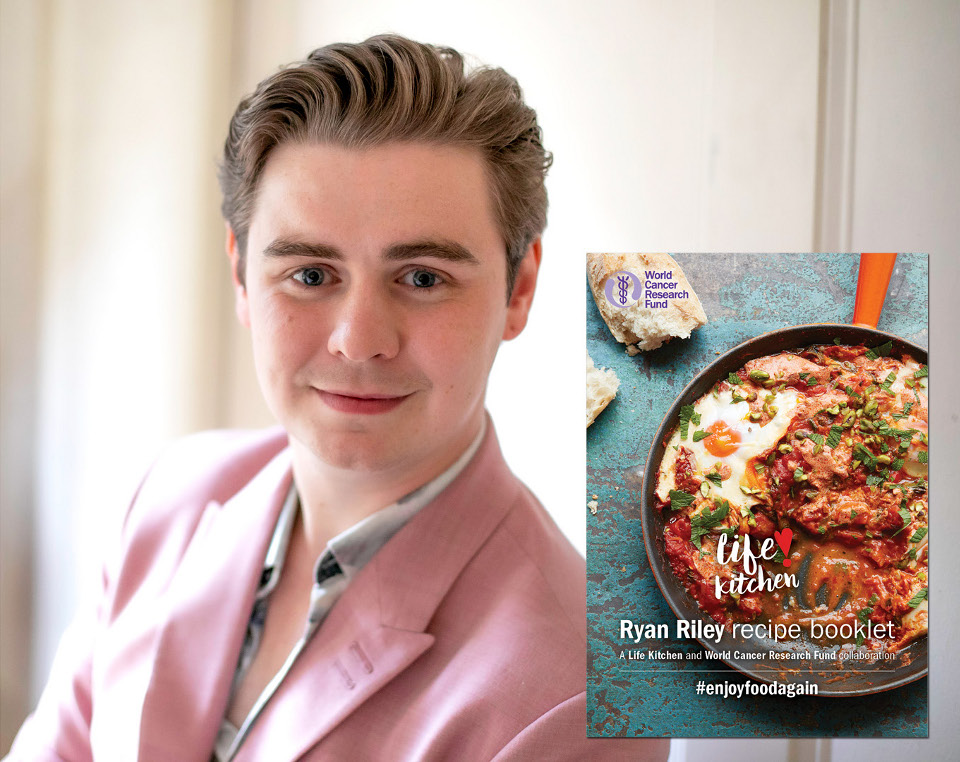
Alexandria Mitchell who was diagnosed with ovarian cancer in 2014:
“When I was going through cancer treatment my taste buds were badly affected. I didn’t enjoy some of my favourite foods anymore and couldn’t even stand to cook them. Many foods had a metallic taste, water tasted weird, and my sense of smell was affected. I didn’t have an appetite, I lost a lot of weight, and my family found it really hard to find foods which I could stomach.
I tried some of the recipes from the booklet and they taste great! I wish I had something like this when I was going through treatment.”
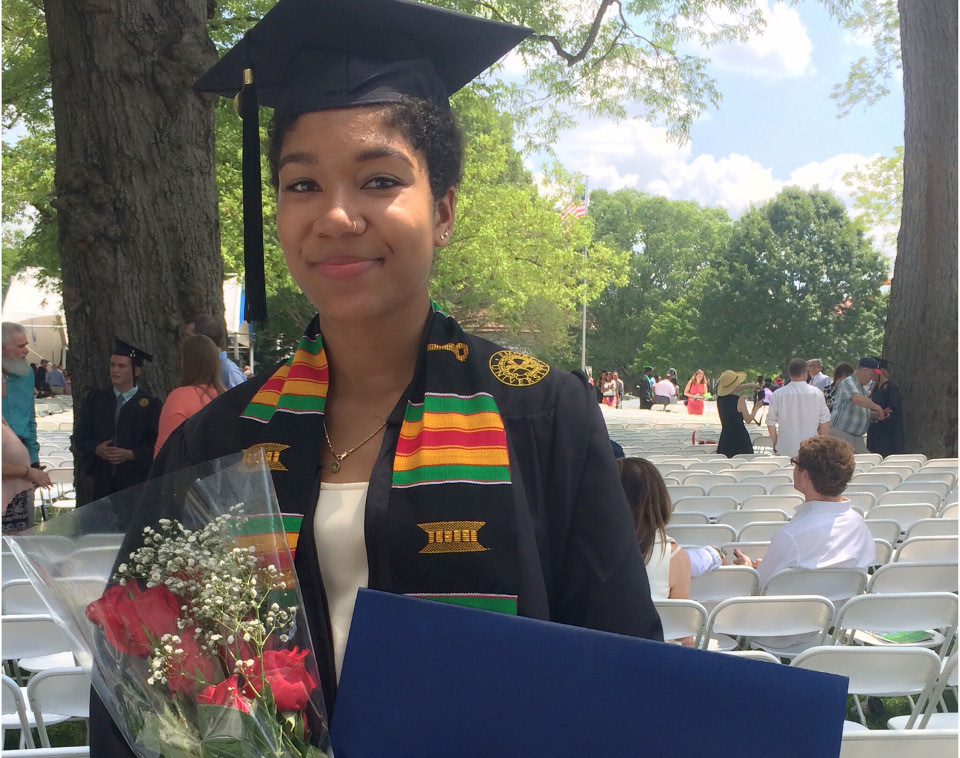
Through our health information programmes, we take the evidence out into the community – to health professionals, families, and individuals, to ensure that everybody has the best chance of reducing their risk of developing cancer, now and in the future.
Promoting patient to patient support
Our pilot Live well during cancer project, funded by the Will Charitable Trust, is supporting people going through cancer by providing them with valuable advice on exercise, diet and how to safely manage the side-effects of cancer and cancer treatment.
We train volunteers, who have themselves had cancer, to deliver these sessions to cancer support groups with the help of one of our oncology specialists.
Our membership scheme for health professionals
We are proud to have reached even more members of the public with life-saving information in 2019 through our Cancer Prevention Membership package. It is created specifically for healthcare professionals and is a one-stop-shop of health resources, world-class free training accredited by the Royal Society for Public Health, and pulls together all of our top cancer prevention publications, and newsletters into one place.
In 2018/19 we successfully recruited an additional 216 health professionals to our scheme, bringing the total to 5,173 members.
Publications
We produced Changing behaviours, a guide for health professionals to help them have effective conversations with patients and clients about healthy lifestyle choices.
Karan Thomas, behaviour change specialist at the Director of Health Development Consultancy, who worked on the booklet, said:
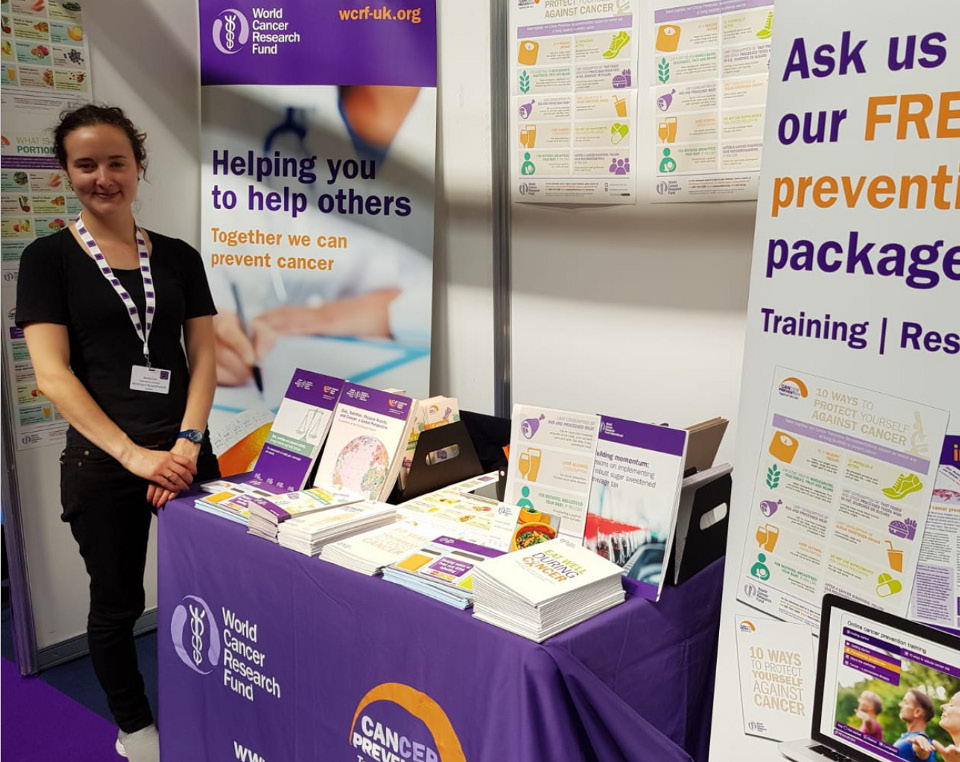
Workshops
We ran two half-day cancer prevention workshops for health professionals, training 22 people working on the frontline. Those who attended increased their knowledge of our Cancer Prevention Recommendations, and developed their confidence in speaking to patients about lifestyle choices to reduce cancer risk.
Exhibitions
Every year we try to go to exhibitions to speak to health professionals and share our work and the crucial role that health professionals play in helping people make healthy lifestyle changes to reduce their cancer risk. This year we exhibited at Nursing in Practice Birmingham, Primary Care and Public Health and the Public Health England annual conference.
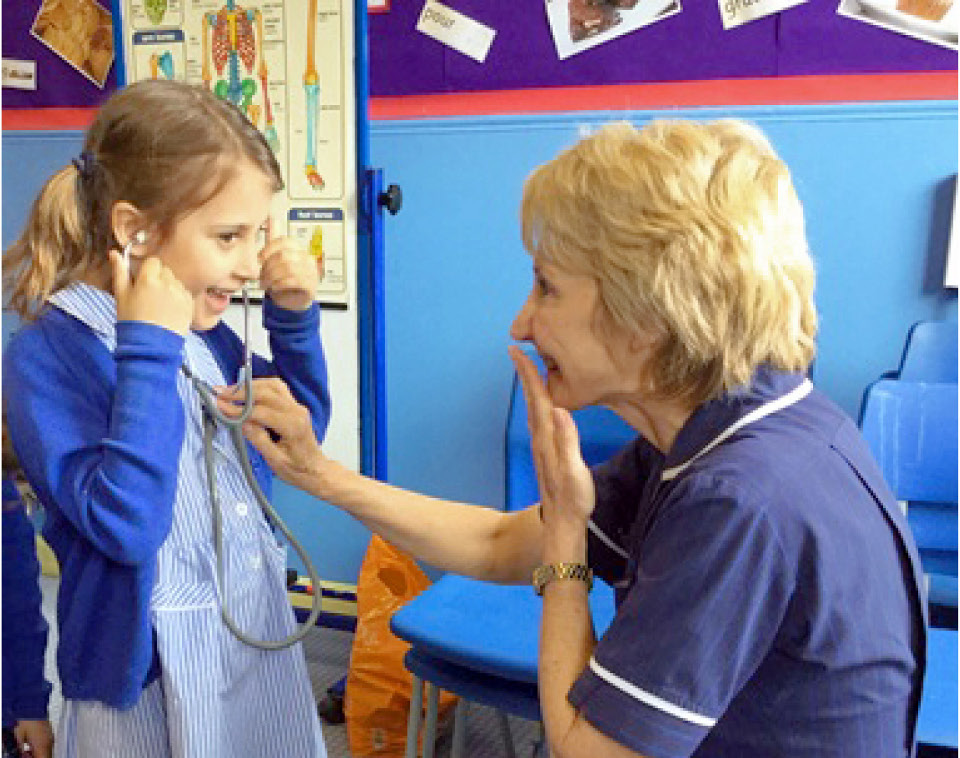
Cindy Magyar, school nurse:
“When I first came across WCRF and all the information it provides to help people eat and live healthily, I remember thinking; “this has to be the best charity in the world” because it is giving people the information and the power to keep themselves healthy and to reduce their risk of developing cancer.”
We would not be able to continue our vital cancer prevention research and health information programmes without the commitment of our supporters.
This year we had 104 wonderful supporters as part of our Team Can Prevent. They took part in a number of different fundraising events ranging from 5Ks to marathons. Together they raised over £105,000. We also had our largest number of Virgin Money London Marathon runners to date, with our very own Events Manager, Priyanka Kotecha, also taking part. Together they raised a staggering £65,000.
We had some exciting community fundraising. Activities ranged from a successful Christmas card campaign to celebrations of anniversaries and birthdays. Together they raised over £55,000.
Stewardship continues to be a big part of what we do, and we continue to increase the number of supporters we have.
Sharing our knowledge
Every year we try to hold events for our supporters to meet some of our researchers. This year we had events in Warwick and Bristol where supporters got to meet researchers Ruth Travis (Oxford University) and Sarah Lewis (Bristol University). We also had two very special guests: Nikki Bednall and Alexandria Mitchell who shared their experience of living with cancer and how following our recommendations has helped them.
Ruth Penny, World Cancer Research Fund supporter:
“I’m happy to know that even after I’m gone, I can still do something about a better future for everyone.”
Leaving a legacy
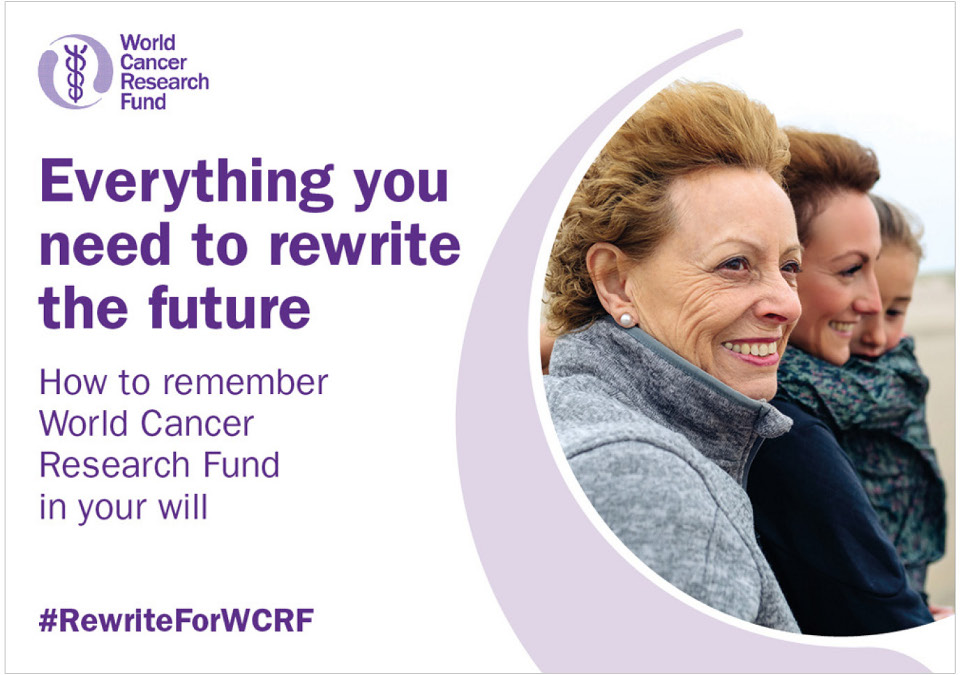
A special thank you
We continue to work with our longstanding corporate partners to raise funds for our vital research and health information projects, while also making sure their employees and loved ones know how to best protect themselves from cancer.
This year saw record donations from global and local partners alike, and we’d like to say a special thank you to 3INA, Informa, SCIEX, PENTAX Medical, S Collins & Sons, Third Bridge and Parseq.
It’s not possible to showcase all the wonderful work that we achieved with our corporate partners this year but here are just a couple.
Cruelty-free make-up brand 3INA wanted to honour the memory of two people very close to their hearts that they’d lost to cancer. They partnered with us to create a new, limited edition lipstick, LIPS FOR LIFE, and donated the proceeds to us. The campaign was a huge success with the product selling out in a couple of months, leading to some of their highest levels of engagement across their social media channels. There are plans for a second campaign next year.
PENTAX Medical wanted to celebrate their 100th birthday in a special way by running a social media campaign and donating $100,000 to us as well as launching their MILES FOR HEALTH to get people active and donating $1 for every mile a person completed – this brought their donation to an incredible $125,000.
We are incredibly grateful for the support we have received from charitable trusts and foundations, including: The Pettigrew Charitable Trust, Hospital Saturday Fund, Oliver Stanley Charitable Trust, The Marguerite Armitage Charitable Trust, The Thomas Moffitt Clark Charitable Trust, PF Charitable Trust, The Lord Belstead Charitable Trust, Roche Products Limited, Ratanben Zaverchand Kara Foundation, and The Peter Courtauld Charitable Trust
Thank you for making all our vital work possible and we are looking forward to working with you, and others, in 2020 and beyond.
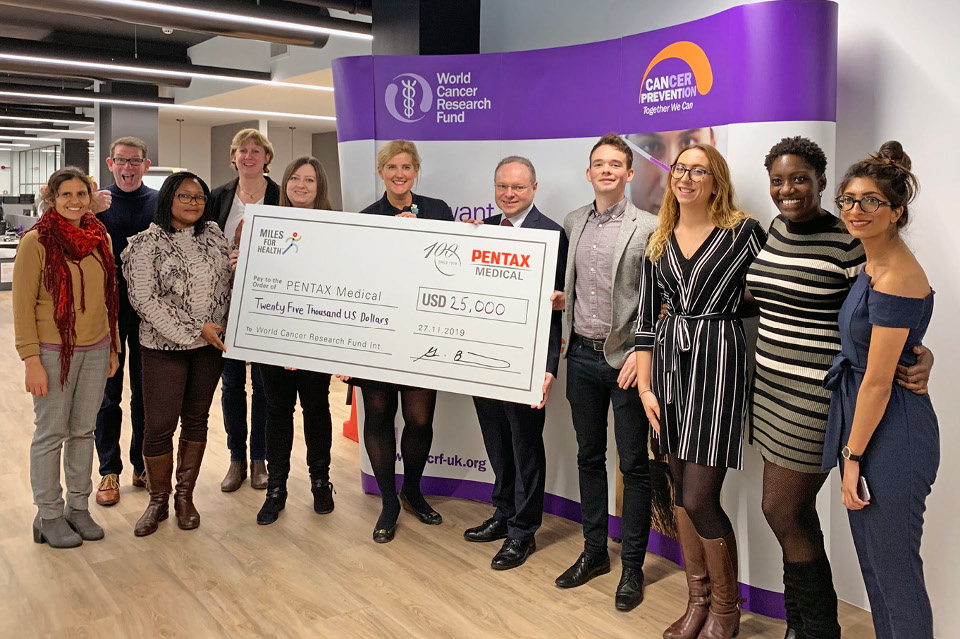
Financial information
World Cancer Research Fund UK
Income 2018–19
- Donations (direct mail, cash gifts and other fundraising activities) – £4,015,245 45.4%
- Legacies – £2,152,674 24.4%
- Committed gifts – £1,233,731 14%
- Gift Aid – £776,850 8.8%
- Other – £653,608 7.4%
Total £8,832,108
World Cancer Research Fund UK
Expenditure 2018–19
- Education, research and health policy programmes – £6,735,968 75.5%
- Cost of generating funds – £2,185,236 24.5%
Total £8,921,204
The full accounts are available on the charity commission website.
The future
Global rates of cancer incidence continue to rise – our expertise is needed more than ever before.
We look forward to marking and celebrating the 30th anniversary of the charity’s formation in 1990. Thirty years ago, our main challenge was to discover the links between diet, lifestyle and cancer. Today this can no longer be denied as fact. However, with cancer and obesity rates both still on the rise we are not there yet. We want to change that and will be doing more to help the public incorporate our recommendations into their everyday lives.
Below are a few of the exciting projects that will be coming next year.
- We will be working hard to identify and develop eight new priority work streams for our future research.
- As part of our involvement in the EU’s CO-CREATE project, we will develop the MOVING database so policymakers, researchers and the public, including young people, can understand what physical activity policies governments have implemented around the world.
- There will be an even greater focus on improving the quality and accessibility of our digital content.
- We will ensure we have powerful cases for support for our fundraising asks, which engage the “Hearts and Minds” of supporters so that we can fund more projects than ever before.
- Our inspiring supporters will continue to receive our dedicated stewardship.
- We will continue to develop our cancer survivor programmes.
- We will further engage and support children and families in healthy eating.

